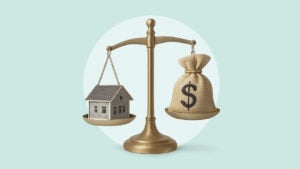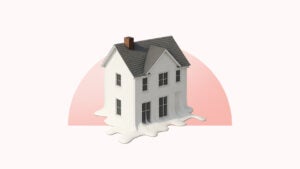Should you pay off your mortgage before a recession?




Key takeaways
- Amid concerns about a potential recession, you may be drawn to paying off your mortgage early, but experts advise this usually isn’t the best idea.
- Paying off your mortgage gets rid of your monthly payment, but it also causes you to reduce your cash savings.
- For homeowners who owe a small amount on their mortgage, paying off the loan may make sense.
As of early 2025, economic uncertainties have given way to rising concerns over a recession. These concerns have been largely triggered by the slew of new tariffs, spending cuts and firings of federal employees enacted by the Trump Administration, which could stall economic growth in the months ahead.
If you are nervous about the potential of an economic downturn, you may be looking for ways to shore up your finances in advance of one. However, if you’re considering paying down your mortgage to prepare for a recession, think again.
Should you prepay your mortgage ahead of a recession?
Most homeowners would be wise to stay the course by continuing to pay down the mortgage monthly rather than in a lump sum, says Greg McBride, Bankrate’s former chief financial analyst.
“In a recession, you want to preserve liquidity, not restrict it,” says McBride. “Paying down the mortgage restricts your liquidity.”
To seriously consider paying down a six-figure mortgage balance, you need a six-figure sum of cash — the “liquidity” McBride refers to. So the question becomes: Would you rather trade your cash cushion for no monthly mortgage payment and a paid-off house, or have a six-figure balance in the bank but continue to owe on your house?
For most homeowners, it makes more sense to hang onto the cash and keep paying down the mortgage in monthly installments.
Pros and cons of prepaying your mortgage before a recession
In some cases, it makes sense to keep making your regularly scheduled mortgage payments during a recession. However, prepaying could make sense in certain situations. Consider the pros and cons of prepaying your mortgage before you do it, which include:
Pros
- Avoid foreclosure: You don’t have to worry about losing your home to foreclosure during a recession if your mortgage is paid off, as the debt has been fully eliminated.
- Pay fewer monthly bills: If the economy hits a rocky patch and your income or cash flow is impacted, having your mortgage paid in full means you’ll have one less monthly debt to pay.
- Sell for cash: If you need money when a recession hits, you could sell your home and pocket the profit instead of using it to pay off your remaining mortgage debt to your lender. This is assuming you can find a buyer during an economic downturn.
Cons
- Reduced cash on hand: Using all your savings to pay off a mortgage leaves you with less free cash that’s easily accessible should you need it.
- Potential loss of competitive interest rate: If you have a competitive interest rate that would be hard to reproduce in today’s rate environment, you’d lose that rate should you buy another home in today’s market.
- Unneeded action: Most recessions are mild and paying off your mortgage is a big step that may not be necessary. You risk emptying your cash reserves to achieve this goal and regretting it.
Who should prepay their mortgage before a recession?
As with any rule of thumb, there are outliers — those folks in special circumstances who might consider paying off their home loan before hard times.
One such group is made up of homeowners who are approaching both retirement and the end of their mortgage terms. If you owe a modest amount — $20,000 or $25,000, for example — and simply want to get rid of your monthly payment, writing a check for the remaining balance might make sense.
For most homeowners, however, the threat of a recession shouldn’t affect how you approach your mortgage.
Good debt vs. bad debt
Owing money on a house can feel risky, but keep in mind where mortgages rank in the debt hierarchy.
Some debt is clearly harmful to your personal finances. Carrying a credit card balance is one obvious example of bad debt. In this case, you’re paying double-digit interest rates to finance meals, vacations and electronics years after charging them to the credit card. You should pay down that debt as quickly as possible, in good times or bad.
Mortgage debt, on the other hand, is one of the most attractive forms of consumer debt available. While interest rates today are higher than they were in 2020 and 2021, compared to other types of debt, the long-term nature of a mortgage can be an asset to your financial health.
What’s more, if you took out a loan or refinanced three or four years ago, you’re probably enjoying a rate around 3 percent. If that’s the case, there’s even less urgency to pay off the mortgage, says McBride. After all, you’ve locked in a historically low interest rate for decades to come.
For most consumers, the home loan should be the last thing you pay down, says McBride. Instead, retire any higher-rate debt you have, such as credit card balances and auto loans. Then, devote excess cash flow to building up your emergency savings and funding your tax-advantaged retirement accounts.
Think through your fears
Home equity is not going to pay the bills; money in the bank will.— Greg McBride, Bankrate's Former Chief Financial Analyst
While the word “recession” sounds scary, the term just means that the economy is shrinking. Even a small contraction in economic activity qualifies as a recession. Also worth remembering: Most recessions are mild, brief and forgettable. For instance, in the two decades after World War II, the booming U.S. economy experienced four recessions but still continued to grow at a breakneck pace overall.
The worst post-war downturn was the Great Recession of 2008, but there is little likelihood that a potential recession in 2025 would approach that financial crisis in severity.
Even if the economy crashes, what would you accomplish by paying off the mortgage? If you lose your job because of a downturn, you’re better off keeping the mortgage open and using your bank balance to not only make monthly payments but also to buy food and pay utility bills.
“Home equity is not going to pay the bills; money in the bank will,” says McBride. What’s more, if the worst-case scenario plays out and you lose your job, you no longer will be able to tap your home equity. Lenders require stable and steady income for a cash-out refinance or a home equity loan. Without an income, your home equity is locked away until you sell.
It can seem like a good idea to repay all your mortgage, but it’s usually not the wisest idea. If you want to get more personalized financial advice, consider consulting a financial advisor.
Why we ask for feedback Your feedback helps us improve our content and services. It takes less than a minute to complete.
Your responses are anonymous and will only be used for improving our website.




